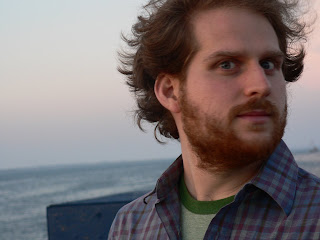My hair still damp, I just walked in the door from an outdoor lunchtime reading in Bryant Park that proved to have the second most exciting weather of any poetry readings I've attended. The most exciting was a year ago, when I flew to Buffalo to attend a
conference at U Buffalo on
Robert Creeley and landed in the midst of a gathering early October blizzard. By the time I made it downtown where the reading was getting underway in a church on the main boulevard, it was flurrying heavily, and just as Robin Blaser got up to read, an overwhelming fusillade of thunder boomed through the gallery. I remember Blaser raising his arms in mock triumph before continuing. It was obviously uninterpretable (no more than the paranoid who holds the airplane or the world aloft through their compunction) and yet totally appreciated, simultaneously overstating and understating the Importance of Art in the face of Nature as an answer that could be tiny and also sufficient. Blaser, not large, was perhaps taking credit where credit was due.
And yet the weather did win after all; I never made it to the conference. Instead, braving the highways of Buffalo in snow so thick with lake effect as to make the road signs literally unreadable, where I holed up during a total electricity blackout in a Marriott in full-on emergency mode: the electric locks on the rooms requiring manual keys and the stocks of snack-size potato chips and irradiated apples running low as the generator's gas supply dwindled. For twenty-four hours it was the apocalypse and then the plows arrived with fresh supplies of early autumn.
This time the squall arose through midtown as
Joshua Clover stood behind a microphone in Bryant Park's so-called
Reading Room. It had already been drizzling around the tent but the rain grew in intensity as Clover read (he suggested at the outset that the scenery was appropriately apocalyptic, and given the oddity of his reading his elegy-for-modernity-through-pop-wizardry poems on September 11 -- compounded with a setting next door to the Fashion Week tent -- one was inclined to believe him) until, interrupting the second work of a line, a huge crash resounded overhead. I wondered across the park what the runway models in their air-conditioned pavillion took as their proximate cause, which seemed surely the appropriate thought to be having: not, what should we do, but, what was it we did.
The fact that the next time Clover repeated the same word - "Capital" - the same thunder replied in its gospel call-and-response only compounded the humor, the avowedly secular death's door conversion. It was money's fault, wasn't it. (Or not fault--laugher.)
And the thing about opulence is someone will always enjoy it. (The recent Paul Goldberger article in the
New Yorker lauding the new Stern palace on CPW reads like an advertisement--pay no attention to the man behind the curtain, etc.) Clover reminded me of this through the title of one of his terrific poems, which referred to the first mall in the world ever constructed, in Brussels: the
Galleries St-Hubert. As if by some force, Farrah and I were drawn through the central streets of Brussels to the glassed promenade when we visited Belgium last year. I would glibly call it an American thing, and yet only in imitation.

We had a free evening and returned in the mall to a movie theater sliced off the Rue de la Reine to see the excellent, conveniently wordless German documentary
Our Daily Bread. Annals of late capitalism, the film presents completely compelling images of the efficient, heavily mechanized food production system that can vacuum every nut from a well-shaken tree, carefully cover acres of root vegetable furrows in gleaming mylar blankets, and, with only a resolute, industrial thud, truss pigs calmly onto an elegant stainless steel Catherine wheel and unzip them at the belly. It's an unsparing film to watch, but excellent and inspiring, offering stories from the slow motion apocalypse that has been going on, to judge by the two-century mall on Brussels' Grand-Place, basically forever. Cue the sound effects, turn down the iPods.



